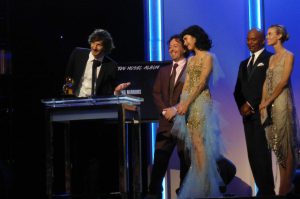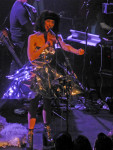Interview: Kimbra breaks from Gotye’s shadow with ‘The Golden Echo’

Kimbra performs at The Independent in San Francisco on Oct. 20, 2014. Roman Gokhman/STAFF.
Kimbra still sees concertgoers with puzzled looks on their faces at her shows. People who’d heard her sing on one song, bought tickets, and were surprised to hear something other than stripped-back, emotional pop. That is only one tool in her tool chest. There are also electronic influences, as well as R&B, jazz, soul and even a bit of hip hop.
Kimbra, Empress Of
8 p.m., Oct. 20
The Independent
Tickets: $20 (sold out) 21+.
The 24-year-old native New Zealander, who kicks off her tour at the Independent on Monday, is willing to accept the challenge of winning fans over for a second time.
“Look, this is a track that Gotye wrote,” she said, referring to the chart-topping, Grammy-winning, meme-inspiring “Somebody That I Used To Know.” “But I think every artist faces that. When they put out a record, and fans are used to one thing, but they go in a different direction. What’s rewarding for me is when people connect with my music because of the spirit of it and the approach and the imagination in it.”
That song may be the reason many Americans have heard of Kimbra Lee Johnson. It topped the Billboard Hot 100 chart, sold 13 million copies and won the Record of the Year and Best Pop Duo or Group Performance Grammys in February 2013.
A different, vulnerable, energy inhabits the song, while most of Kimbra’s own material is beat-heavy, danceable and funky, with influences as varied as Prince and Björk.
“There’s a strength to my performance of that song and a kind of fragility, and I think I’ve performed that on (other) songs,” she said. “I think there are definitely moments on my records that inhabit that same energy.”
Prior to “that song,” Kimbra was more well-known in New Zealand and Australia, where she has also lived before moving to Los Angeles several years ago. She released her debut, Vows, in 2011 (it was released in the U.S. the following year with additional songs, including “Warrior,” a collaboration with Mark Foster, of Foster the People). The record reached No. 14 on the Billboard Top 200 chart.
A day after winning her Grammys, Kimbra rented a room on a Los Angeles urban farm owned by a beekeeper, and over 18 months, wrote her sophomore album, The Golden Echo, surrounded by livestock. She cooked her meals fresh at an outdoor kitchen.
“In New Zealand, I had mountains and amazing landscapes, and that always made me quite inspired,” Kimbra said. “I wanted to find that in California. Being around animals and nature definitely humbles you, and it gets you back into the experience of being a child, which I think is a great place to create music from.”
Producer Rich Costey (Muse, Weezer, Santigold, Nine Inch Nails) was brought on board to produce the album, and he would end up earning every bit of his paycheck, as an avalanche of guest artists and songwriting collaborators funneled through his studio.

Kimbra and Gotye accepting one of their Grammy Awards at the pre-telecast ceremony at the Nokia Theatre in Los Angeles on Feb. 10, 2013.
Among them: John Legend, Matt Chamberlain of Pearl Jam, Dirty Projectors’ Dave Longstreth, The Mars Volta’s Omar Rodríguez-López, R&B vocalist Bilal, Michael Jackson’s studio drummer John “JR” Robinson, Matt Bellamy of Muse, Queens of the Stone Age‘s bassist Michael Shuman (playing drums, because why not?), Flying Lotus bassist Thundercat, Unknown Mortal Orchestra’s Ruban Nielson, Silverchair’s Daniel Johns, Mark Foster, and so on.
It was never her goal to incorporate every musician to pass through Los Angeles on The Golden Echo, Kimbra said. She met her collaborators on previous tours, and continued to stay in touch with them, inviting them to play together, looking to have some fun. Many of those artists became friends, and offered up their own ideas when she began writing.
The first single, ‘90s Music,” features contributions from Foster and Bellamy, and name-checks Michael Jackson, Nirvana, Mariah Carey, R. Kelly and others. The song presents contradicting feels; reminiscing over nostalgia, while at the same time sounding nothing like music played on radio during that decade.
“Nobody But You,” featuring John Legend, was originally written for his record. When he didn’t find a spot for it on his album, Kimbra claimed it for herself, reworking the vocals an arrangement.
At the moment, her favorite track is “Rescue Him,” which she says has “got a sensual kind of mood to it,” as well as a bridge key change that hits like a drop in altitude.

Kimbra performs at The Independent in San Francisco on Oct. 20, 2014.
Overall, the album celebrates its diversity, but that’s not a sign that it lacks cohesiveness, Kimbra said. The Golden Echo is named after a flower, which itself is named after the Greek myth of Narcissus, a boy who died after becoming transfixed by his reflection in a lake.
“The record is looking at the idea of how we find identity by constantly looking at ourselves,” she said. “There’s also a spiritual undertone about being called outside of yourself, and how to find love in different places. It’s also got a sense of youth about it – going from a place of being very young and falling into a place of finding yourself in a world as you grow up.
“The human experience is often eclectic and diverse and full of different emotions,” she said. “So I wanted to convey them on this record.”
- Kimbra performs at The Independent in San Francisco on Oct. 20, 2014.
- Kimbra performs at The Independent in San Francisco on Oct. 20, 2014.
- Kimbra performs at The Independent in San Francisco on Oct. 20, 2014.
- Kimbra performs at The Independent in San Francisco on Oct. 20, 2014.
- Kimbra performs at The Independent in San Francisco on Oct. 20, 2014.
Follow Roman Gokhman at Twitter.com/RomiTheWriter.





